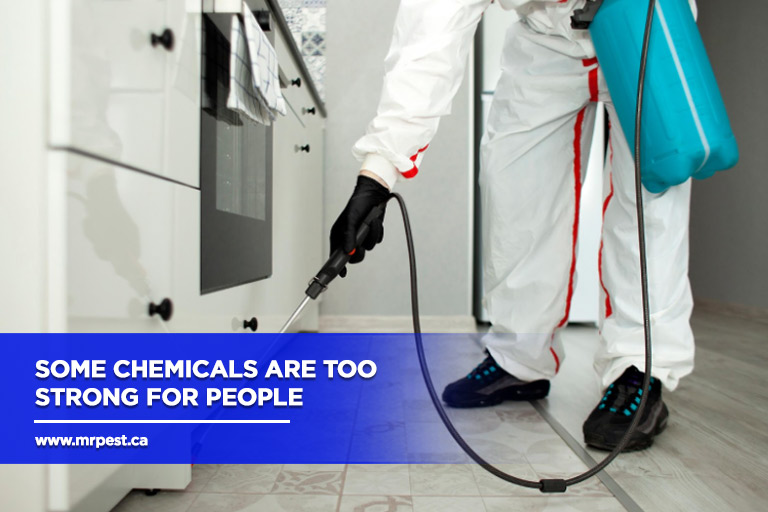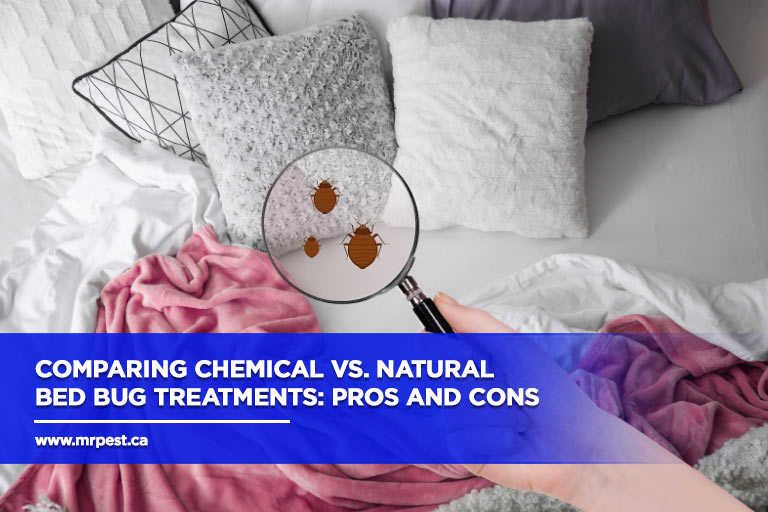Bed bug infestations have become an increasing concern for homeowners, as these resilient pests are notoriously difficult to eliminate. In fact, a 2003 study revealed that Toronto Public Health received bed bug complaints from 46 locations, with the majority of cases coming from apartments, shelters, and rooming houses.
Pest control operators responded to even more cases, treating 847 locations, with single-family homes being the most affected. When it comes to tackling this persistent problem, two common approaches dominate: chemical treatments and natural remedies.
Each method has its own set of advantages and drawbacks, leaving many wondering which option are best for their situation. Let’s compare the pros and cons of both chemical and natural bed bug treatments, offering a clear picture to help you choose the right solution for your needs.
Overview of Chemical Bed Bug Treatments
Chemical bed bug treatments are one of the most widely used methods for eradicating infestations, particularly in areas with reported problems, such as bed bugs in Collingwood or Barrie. These treatments involve the use of synthetic pesticides and insecticides designed to kill bed bugs on contact or through residual exposure.
How Chemical Treatments Work
Chemical treatments work by targeting the bed bugs’ nervous system or physically affecting their ability to survive. Professional pest control services often use sprays, dusts, and even fumigation techniques to ensure thorough coverage, reaching hidden areas where bed bugs tend to nest.
Types of Chemicals Commonly Used
Some of the most common chemical agents include pyrethroids, which paralyze bed bugs by disrupting their nerve function, and neonicotinoids, which are synthetic nicotine compounds that attack the bugs’ nervous system.
In more severe cases, professionals may use stronger fumigants like sulfuryl fluoride to penetrate deep into furniture and walls. These treatments are usually applied in combination to prevent the pests from developing resistance.
Pros of Chemical Bed Bug Treatments
Chemical bed bug treatments offer several benefits that make them a popular choice for tackling infestations, especially in severe cases.
Effectiveness
Chemical treatments are known for their ability to eliminate bed bugs quickly and efficiently. Professional-grade insecticides can target both adult bed bugs and their eggs, reducing the likelihood of a recurring infestation. This is particularly effective in large or deeply infested areas where natural remedies may struggle to reach every crevice.
Residual Protection
One of the major advantages of chemical treatments is their residual effect. Many chemical sprays continue to work long after the initial application, providing ongoing protection by killing any bed bugs that come into contact with treated surfaces for weeks, or even months, after the treatment.
Availability
Chemical treatments are widely accessible, with numerous options available both over-the-counter and through pest control professionals. This makes it convenient for homeowners to quickly address infestations without the need for specialized equipment or hard-to-find products.
Many pest control services are also well-versed in chemical applications, ensuring that the treatments are applied safely and effectively.
Cons of Chemical Bed Bug Treatments
While chemical treatments can be effective, they come with several downsides that homeowners should consider before choosing this method.
Health Risks

Exposure to chemical pesticides poses potential health risks, especially for children, pets, and individuals with respiratory issues. Some chemicals may cause skin irritation, allergic reactions, or more serious complications if inhaled or ingested. Homeowners often need to vacate the premises temporarily during treatment to avoid direct exposure to these harmful substances.
Chemical Resistance
A growing concern with chemical bed bug treatments is the development of pesticide resistance. Over time, bed bugs can build up immunity to commonly used chemicals, reducing their effectiveness. This can make repeat treatments necessary, as surviving bed bugs continue to reproduce, leading to ongoing infestations.
Environmental Impact
Chemical treatments can have a negative impact on the environment. Pesticide runoff may contaminate soil and water sources, and non-targeted use of chemicals can harm beneficial insects like bees and other wildlife.
These environmental consequences have led to an increased interest in eco-friendly alternatives, which avoid the toxic effects associated with chemical-based pest control methods.
Overview of Natural Bed Bug Treatments
Natural bed bug treatments have gained popularity as an alternative to chemical methods, especially for those who prioritize safety and environmental concerns. These treatments focus on using non-toxic ingredients and techniques to eliminate bed bugs without the harmful side effects associated with synthetic chemicals.
How Natural Treatments Work
Natural treatments rely on physical, mechanical, or plant-based methods to kill bed bugs. These include using heat, essential oils, or natural powders that dehydrate or disrupt the insects’ ability to survive.
Heat treatments, for example, raise the temperature in infested areas to levels that are lethal to bed bugs, while diatomaceous earth, a natural powder, damages their exoskeleton, causing dehydration and death.
Types of Natural Remedies
Popular natural remedies include diatomaceous earth, which is spread around infested areas to dry out the bugs, and essential oil-based sprays that repel or kill them.
Heat treatments (where temperatures are raised to 120°F or higher) are another highly effective option. Other methods include steam cleaning and vacuuming, which physically remove or kill bed bugs without introducing harmful substances into the environment.
Pros of Natural Bed Bug Treatments
Natural bed bug treatments offer several appealing benefits, particularly for individuals looking for safer, non-toxic solutions.
Safety for Humans and Pets
One of the biggest advantages of natural treatments is their safety for people and animals. Unlike chemical treatments, natural methods do not introduce harmful toxins into the home. This makes them a great choice for households with young children, pets, or individuals sensitive to chemicals, as there’s no need to worry about exposure or lingering residues.
Environmentally Friendly
Natural treatments are eco-friendly, as they don’t contribute to soil or water contamination. Methods like heat treatments or using diatomaceous earth have little to no negative impact on the environment, making them a sustainable option for pest control. This is especially important for those who are conscious of reducing their ecological footprint.
No Resistance Issues
Bed bugs are unlikely to develop resistance to natural methods. Unlike chemicals, which pests can build immunity to over time, treatments like heat or physical barriers (such as diatomaceous earth) work by physically damaging or killing the bed bugs, eliminating the risk of treatment resistance. This makes natural remedies a consistent option for long-term bed bug control.
Cons of Natural Bed Bug Treatments
Despite their many benefits, natural bed bug treatments also have limitations and potential drawbacks that should be considered.
Slower Results

Natural treatments often take longer to show results compared to chemical methods. For instance, heat treatments require prolonged exposure to high temperatures, and diatomaceous earth works gradually as it dehydrates bed bugs over time.
This slower action means that dealing with severe infestations might require more patience and repeated applications.
Limited Residual Effect
Many natural remedies do not offer the same long-lasting protection as chemical treatments. For example, essential oil sprays might need frequent reapplication to maintain their effectiveness, and natural powders like diatomaceous earth lose their efficacy once they become wet or are disturbed.
As a result, continuous monitoring and treatment may be necessary to ensure that all bed bugs are eradicated.
Lower Availability and Effectiveness
Natural treatments may not be as readily available or as effective in cases of severe infestations. While options like heat treatments can be highly effective, they often require professional equipment and expertise.
Natural remedies might also not address every aspect of an infestation, particularly if bed bugs have spread to hard-to-reach areas or have developed resistance to certain natural solutions.
Your Reliable Solution for Bed Bugs
Choosing the right bed bug treatment can make all the difference in effectively managing an infestation. Whether you lean towards chemical or natural methods, understanding the pros and cons will help you make an informed decision.
If you’re dealing with bed bugs in Barrie and Collingwood, Mr Pest Control is here to help. Contact us at (705) 739-7378 for expert advice and tailored solutions to reclaim your space.



